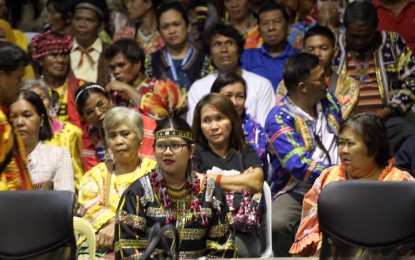
Cherry Ann Codilla gets support from the Bagobo-Klata tribe elders and her family during Tuesday's regular session when the National Commission on Indigenous Peoples (NCIP) presented its report denying her a certificate of affirmation. PNA-Davao
DAVAO CITY--The National Commission on Indigenous Peoples (NCIP) has disqualified the Indigenous Peoples’ Mandatory Representative (IPMR) to the City Council on the grounds of bloodline and track record.
Ending speculations in the delay of NCIP’s issuance of a Certificate of Affirmation (COA) to Cherry Ann Codilla, NCIP 11 (Davao) Director Geroncio Aguio finally served the notice to disqualify Codilla because she did not meet the eligibility requirements on ancestral lineage and track record in serving the IP community.
During Tuesday’s regular City Council session, Aguio said Codilla only has 6.25 percent Bagobo-Klata blood when her genealogical details were validated by the NCIP.
Except for her service at the Talaukom or the IP council of elders, he said Codilla has no other track record to show she is actively engaged in the IP community in the past five years.
There was also no record of her participation in community undertakings of the Bagobo-Klata, or activities pertaining to her ancestral domain.
The 31-year-old Codilla was selected by majority of the Bagobo-Klata tribe during a selection process last April, with overwhelming votes of 241 out of the 431 members of the Talaukom.
Codilla, a registered nurse, then submitted her records for the issuance of a COA. NCIP received her documents on April 26, and when it validated Codilla's records, it took notice of two issues hampering her eligibility.
On Codilla’s genealogical status, Aguio said that after checking the book on the tribe’s Certificate of Ancestral Domain Title (CADT), the NCIP discovered that she is not at least 25 percent Bagobo-Klata by blood, contrary to the documents she submitted.
He said the validating team also went through the names in the CADT list and conducted interviews of elders to determine Codilla’s ancestral lineage. Her bloodline was traced from her great great grandparents of mixed Obo-Manobo, Bagobo-Tagabawa, Bagobo-Klata down to her parents with inter-marriage to Visayans.
The NCIP official also cited Codilla’s lack of fluency in speaking the Bagobo-Klata dialect.
Aguio noted that the NCIP decision was based on rules and guidelines of the IPRA law and the IP community’s local guidelines, which provide that an IPMR should have 100 percent or at least 25 percent blood of the IP tribe.
With Codilla's disqualification, Aguio requested the Bagobo-Klata tribe to hold another selection process, reminding the tribe’s elders to follow the eligibility requirements.
However, Codilla said she will contest NCIP's decision.
Codilla on Tuesday said she has been engaging with her own IP community, having been a staff member of the former IPMR from the Ata tribe and representing her mother, a former deputy mayor in the third district, who is also a member of the Talaukom council.
Codilla maintains she has 25 percent Bagogo-Klata blood and her family tree would show her ancestral lineage.
She, however, admitted that she is not fluent in the dialect just like the younger generation of the IP community.
Codilla said she was overwhelmingly selected by her tribe's elders and takes strength from them to overcome the obstacle she is facing.
She has found an ally with the City Council, whose members passed a resolution asking the NCIP to recognize her as the selected IPMR based on the result of the selection process by the tribe’s council of elders.
Aguio declined to comment on the resolution, saying, “We will cross the bridge when we are there.”
He noted that Codilla’s case is a first for NCIP, saying some 1,000 IPMRs have already been validated and issued COAs but no such case has been rendered like Codilla’s.
The NCIP’s decision will always be based on evidence, Aguio said, adding that for now, the commission will follow the rules and guidelines under the IPRA law. (PNA)
